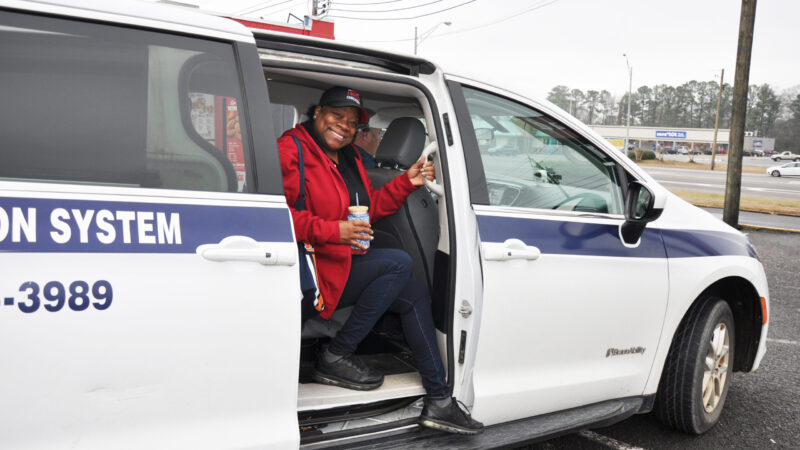Price of Poverty: Time Banks
In times of economic instability many people turn to friends and family. But there’s a new twist on that practice and it’s called Time Banking. Members of time banks earn and spend “time” dollars by using their skills for other members. And as WBHM intern Sushma Boppana reports, there’s an effort to get a time bank started here in Birmingham.
Dana Pharo is a stage manager at the Alys Stephens Center. She works 40+ hours a week setting up and running shows, events, and lectures.
“My days off are not Saturday and Sunday like the rest of the planet. Mine, it’ll be a Monday, it might be a Friday. If its two days together life is wonderful!”
Pharo says loves taking ideas on paper and making them a reality. What she doesn’t necessarily love is the reality of her paycheck. Pharo says she makes less than the average stage manager. She refuses on principal to own a credit card, so that means money is often tight. She thinks time banking might help her make the most of her little free time and money.
What is Time Banking? Edgar Cahn is credited with founding the movement. He compares time banking with a babysitting pool.
“You put in one hour babysitting for somebody else and then when you need babysitting you call up anybody in the pool and they will return the hours that you’ve put in.”
It’s Not Just Babysitting
Time bank members provide services ranging from home repair to tutoring to event planning. Ed Collom is a sociologist at the University of Southern Maine.
“The whole concept of time banking is very flexible, and it can be started by community activists that want to better their local community or it could be used in existing organizations and institutions as a way to connect the clientele and have them helping each other.”
That’s what Greater Birmingham Ministries is hoping to do. At a recent meeting, GBM made the pitch for starting a system here in Birmingham.
Skeptics
Rev. Lawton Higgs is founding pastor at Church of the Reconciler. He often works with homeless people in downtown Birmingham. He says timebanks sound like a great idea for people who already have a place to live and food on the table. The time bank could help them round out the corners. But Higgs says for residents most at-risk, the needs are just too great for a time bank.
“What homeless people need in Birmingham is transportation. Or what homeless people need in Birmingham is health care. The needs are so massive and the injustice so huge.”
Optimists
Time bank proponents like Ed Collom admit time banks won’t meet all of the material need of participants. But, they say, time banking’s greatest benefit is the relationship it builds between members.
“You read about this decline of social capital that has been underway for the last 30, 40 years in this country. And what time banking organizations do is help rebuild community, reconnect neighbors, and its people helping each other.”
So what would Dana Pharo love to use her time dollars for?
“I hate yard work. Someone to help me straighten up, basically because our house is a little older and needs a little work, but I don’t have time to work on it. I do a few things, but most of the time I only have time to do the laundry and the groceries, which gets boring.”
In return, she could DJ a party or set up a lecture. Because, afterall, in time banking everyone has something to offer.
Kalshi reveals insider trading case against editor for MrBeast
With prediction markets booming, so have concerns about insider trading. Now, Kalshi has disclosed its first public actions against accounts suspected of trading on confidential information.
Greetings from Jordan’s Wadi Rum desert, where patches of green emerge after winter rains
Wadi Rum's otherworldly landscape is where Star Wars movies and The Martian were filmed. In late winter, plants emerge in this desert — but some are toxic to camels, so their herders must protect them.
Lack of transportation keeps many Alabamians from working. Rural public transit programs are trying to help
While lack of transportation is a major employment barrier in Alabama, few people take public transit to work. That dynamic is even more pronounced in rural areas.
When a horse whinnies, there’s more than meets the ear
A new study finds that horse whinnies are made of both a high and a low frequency, generated by different parts of the vocal tract. The two-tone sound may help horses convey more complex information.
Hundreds of American nurses choose Canada over the U.S. under Trump
More than 1,000 American nurses have successfully applied for licensure in British Columbia since April, a massive increase over prior years.
Trump’s many tariff tools mean consumer prices won’t go down, analysts say
The Supreme Court struck down President Trump's signature tariffs. But the president has other tariff tools, and consumers shouldn't expect cheaper prices anytime soon, economists say.






